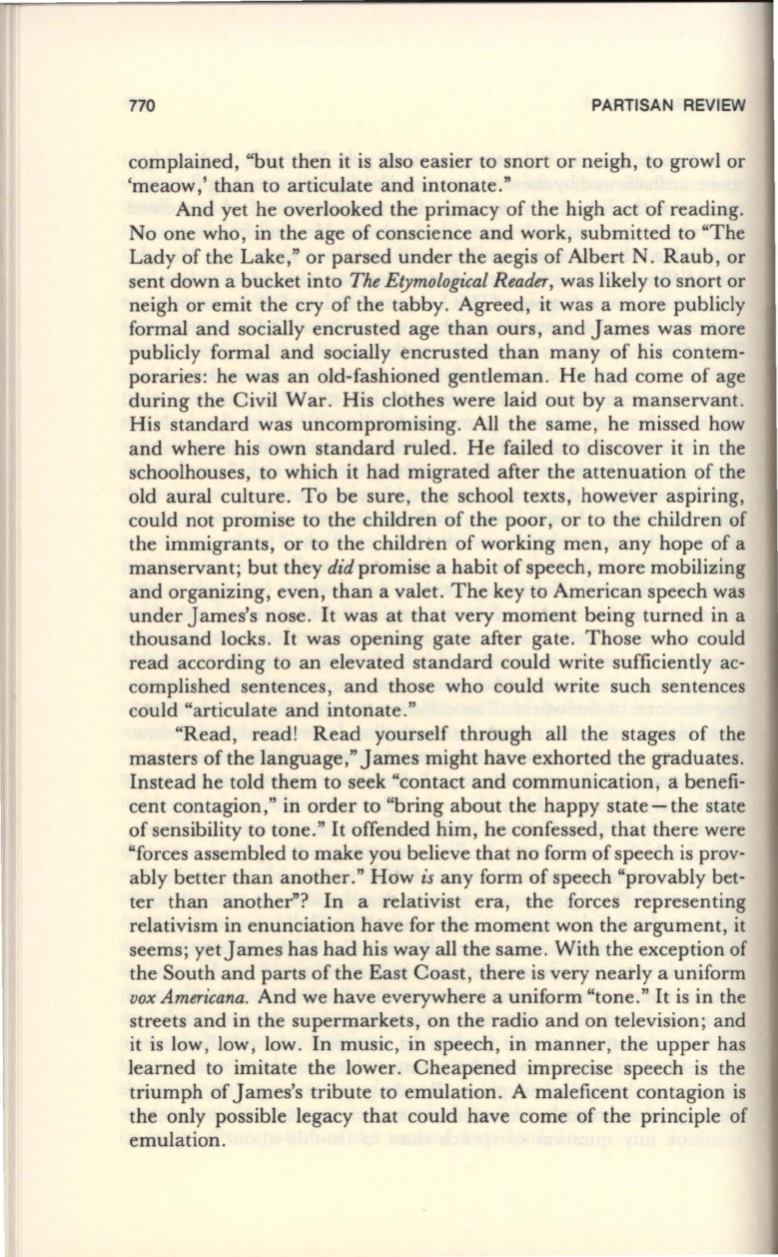
770
PARTISAN REVIEW
complained, "but then it is also easier to snort or neigh, to growl or
'meaow,' than to articulate and intonate."
And yet he overlooked the primacy of the high act of reading.
No one who, in the age of conscience and work, submitted to "The
Lady of the Lake," or parsed under the aegis of Albert N . Raub , or
sent down a bucket into
The Etymological Reader,
was likely to snort or
neigh or emit the cry of the tabby. Agreed, it was a more publicly
formal and socially encrusted age than ours, and James was more
publicly formal and socially encrusted than many of his contem–
poraries: he was an old-fashioned gentleman. He had come of age
during the Civil War. His clothes were laid out by a manservant.
His standard was uncompromising. All the same, he missed how
and where his own standard ruled . He failed to discover it in the
schoolhouses, to which it had migrated after the attenuation of the
old aural culture. To be sure, the school texts, however aspiring,
could not promise to the children of the poor, or to the children of
the immigrants, or to the children of working men, any hope of a
manservant; but they
did
promise a habit of speech, more mobilizing
and organizing, even, than a valet . The key to American speech was
under James's nose. It was at that very moment being turned in a
thousand locks .
It
was opening gate after gate. Those who could
read according to an elevated standard could write sufficiently ac–
complished sentences, and those who could write such sentences
could "articulate and intonate ."
"Read, read! Read yourself through all the stages of the
masters of the language," James might have exhorted the graduates.
Instead he told them to seek "contact and communication, a benefi–
cent contagion," in order to "bring about the happy state-the state
of sensibility to tone." It offended him, he confessed, that there were
"forces assembled to make you believe that no form of speech is prov–
ably better than another." How
is
any form of speech "provably bet–
ter than another"? In a relativist era, the forces representing
relativism in enunciation have for the moment won the argument, it
seems; yetJames has had his way all the same . With the exception of
the South and parts of the East Coast, there is very nearly a uniform
vox Americana.
And we have everywhere a uniform "tone." It is in the
streets and in the supermarkets, on the radio and on television ; and
it is low, low, low. In music, in speech, in manner, the upper has
learned to imitate the lower. Cheapened imprecise speech is the
triumph of James's tribute to emulation. A maleficent contagion is
the only possible legacy that could have come of the principle of
emulation.


